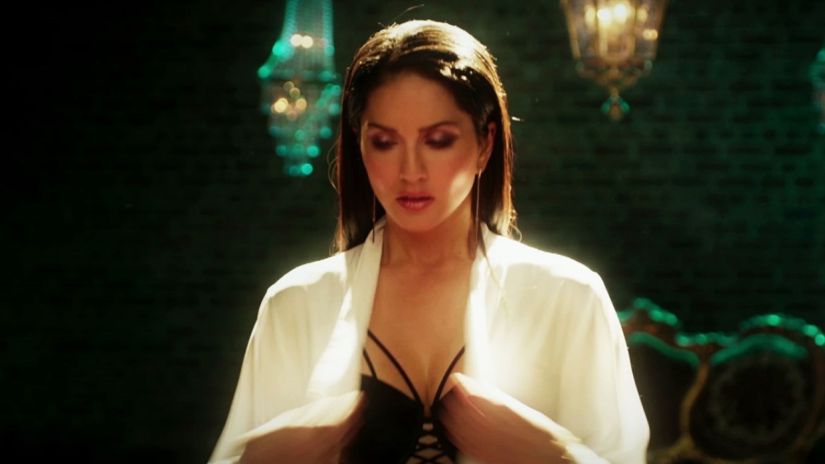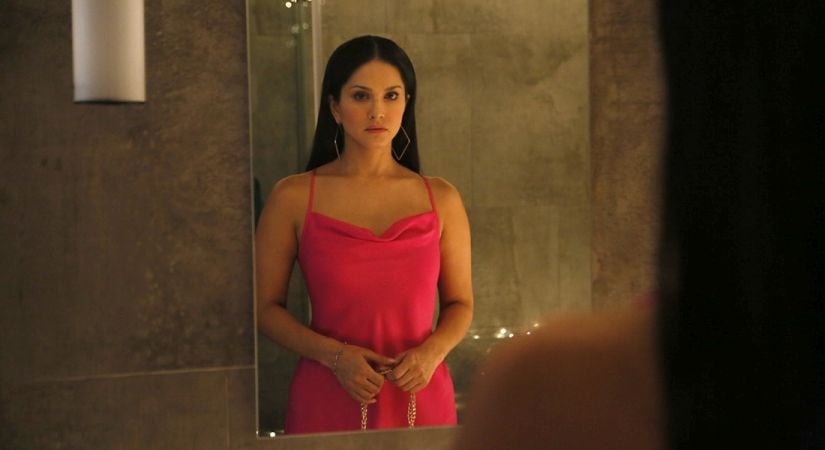The opening scene of Zee5’s latest original series, Karenjit Kaur: The Untold Story of Sunny Leone, shows the actress hesitating to disrobe before her first shoot for a lingerie brand. Her tense face and hands quivering on the belt of her wrap reflect not only the central conflict of her official biographical series, but also the emotional dilemma she must have faced in telling her story. In the times of
_Sanju_ , biopics, particularly of film celebrities, find themselves under constant scrutiny for their objectivity, or lack thereof. Skeptics would also think that with Sunny starring as herself in the biopic, it could have conveniently made the project a vanity affair. Having bared it all in front of the camera for two decades now, Sunny had to deal with an entirely different beast this time — stripping herself of the inhibitions to tell her story as it is. [caption id=“attachment_4780631” align=“alignnone” width=“825”]
 Sunny Leone in a still from Karenjit Kaur: The Untold Story of Sunny Leone[/caption] The first season of the show traces Sunny’s journey from her childhood years to becoming the Penthouse Pet of the Year in 2003. Since most of the Indian media coverage on her began only after she entered Bigg Boss 5, the biographical series’ authenticity lies mostly in Sunny’s cherry-picking of her life events. But this writer will not mind giving her the benefit of doubt. The chapters of her life that she chooses to throw light on feel real. She has addressed her inhibitions, guilty pleasures and even regrets, through an engaging tale. Her story would make for a unique case study for Indian women aspiring to join the adult entertainment industry. The most engrossing part of the biographical series, however, is not what happens beneath the sheets, but behind the closed door of her home in Ontario, Canada and subsequently, Lake Forest, California. She was born as Karenjit Kaur in a Sikh family consisting of an understanding father, a verbose-yet-affectionate mother (isn’t that every Punjabi mother ever?) and a supportive younger brother. What makes the familial aspect of her life an interesting chapter is that it gives an insight into the disaporan India community in the US and Canada. Despite living in first world countries since the early 1980s, Sunny’s parents have not come to terms with the progressive outlook that Indians are more comfortable with today. Their worldview is limited to the collective thought process of the Sikh community. For Sunny’s mother, the world ends at making her sister-in-law jealous of her new diamond bangles. But Sunny and her brother, having grown up in Canada and the US, are more open to the idea of embracing a modern lifestyle. Under tremendous pressure, her father gives up his turban to integrate in a society apprehensive of his Sikh identity (particularly in the early ’80s since Khalistan was at its peak then). Fast forward to the late 1990s, and Sunny goes through the same ordeal as her dad — in a completely different context. Minutes before she sheds her clothes for the first time, she overhears a conversation between three American models who whine about an Asian snatching away ‘yet another job’ in ‘yet another industry’. Immigration from India became a pressing issue in the late ’90s — particularly after 1993 when the Indian economy opened itself to globalisation. Both Sunny and her father’s quest for work in the US and Canada respectively hold significance in the Donald Trump-dominated global narrative of the contemporary era. The socio-political climate finds fleeting mentions in Karenjit Kaur: The Untold Story through minor references peppered all over the narrative, instead of having Sunny narrate the obvious through the “wo Bill Clinton ki sarkar ka samay tha” template. Political leaders are introduced through campaign posters and radio broadcasts. In a typically Sikh NRI reaction, Sunny’s father responds to Arnold Schwarzenegger’s election as the Governor of California, “Batao, ab Terminator bhi saala Governor banaega,” commenting on the control that the state exercised on Hollywood at that time. And obviously, there is a had-to-be-there reference to Harry Potter when Sunny gifts her brother The Chamber of Secrets on Christmas. These small moments help in establishing and furthering Sunny’s family dynamics. Her father (Bijay J Anand) loses his job in Canada which prompts him to move, along with family, to his sister’s place in the US. His unemployment is crucial in nudging Sunny towards the adult entertainment industry, though she does clarify that she had the choice to give up on the life of glitz and glamour eventually. Anand does a terrific job of portraying the father who is the anchor of the family, desperately trying to keep everyone connected. He orders pizza every time there is a bad news (who wouldn’t want pizza a dad like that). Anand’s standout moments are when he breaks down after learning about Sunny’s occupation, and launching into a no-holds-barred bhangra with his wife when ‘O Main Nikla’ from Gadar: Ek Prem Katha plays on the radio. [caption id=“attachment_4780641” align=“alignnone” width=“825”]
 Sunny Leone in a still from Karenjit Kaur: The Untold Story of Sunny Leone[/caption] Sunny’s mother (Grusha Kapoor) is a closet alcoholic under the guise of a conventional saade sanskar Punjabi matriarch. While her father’s unemployment explains why Sunny turned to the pornography industry, her mother’s addiction to alcohol shows the actress’ fears of continuing on her chosen path. Watching her daughter on the cover magazine of “waise wali” magazines could have pushed her mother harder down the rabbit hole. It is a lingering fear in Sunny’s mind and is also the cause of their heated arguments. Grusha does not miss a beat as Balwant Kaur Vohra (or Bubbles as her husband dotingly calls her). She makes her surrender to chronic drinking pitiable and her enraged responses to her unsanskari children hilarious. Karanvir Lamba plays Sunny’s younger brother Sundeep. Besides being her most effective support system, his character has been employed as a narrative device. At various junctures of the narrative, the frame freezes and he starts talking to the camera, breaking the fourth wall. Lamba’s charming face makes director Aditya Dutt’s Talking Tom approach towards his character a forgivable act. Besides Sundeep, Sunny’s persona is further explored through her infamous Bhupinder Chaubey interview in 2016. She touches upon every contentious qustion Chaubey raised in the interview. It feels like the bioographical series is a belated, visual response to the journalist’s questions. Thus, it does function as a PR exercise for Leone but not to the extent of compromising with commonly known facts. She also refutes the allegations of her projecting her current family life in order to fit into the mould of an acceptable ‘Indian’ celebrity. But the eighth and ninth episode that traverse through the early days of her relationship with her husband Daniel Weber are the most underwhelming portions of the 10-part series. Probably, the biopic will delve deeper into that chapter in the next season which will trace her entry into hardcore pornography and foray into Bollywood. While her account of those years will be subjected to a stricter litmus test, her alleged attempts to paint herself as a quintessential Indian ‘soni kudi’ may not hold water as far as the first season is concerned. (Certainly, she has been frank about her bisexual leanings and sexual encounters.) Chaubey’s interview is not the only narrative tool that serves as a flashback. The screenplay is cleverly written and the editing perfectly executed, besides certain annoyingly long slow-motion sequences. The non-linear narrative works really well here as the life decisions of Sunny Leone, the brand, are juxtaposed against those of Karenjit Kaur, the person. In a fairly brilliant example, her parents naming her Karenjit in a guruduara runs parallel to her godfather rechristening her at the helm of her adult entertainment career. Thus, the narrative tosses and turns from early ’80s to early ’90s to early 2000s to 2006, plotting her journey, in both personal and professional capacities, not on a straight path but as a jigsaw puzzle, almost identical to her complex personality. The platform complements the narrative as well. Through this observation, this writer is not alluding to the sexual references. In fact, the web series format allows the writers time to unfurl the phenomenon that Sunny is. Also, the conversations flow freely as Zee5 stands by its logo ‘Apni Bhasha Mein Feel Hai’ and gives space to the characters’ languages that range from Punjabi to English. It must have been extremely challenging on Sunny’s part to live her life all over again. Hindsight often changes one’s perspective and thus, comes in the way of recreating an emotion that one felt years ago. However, Sunny rises above a rear view mirror misted by nostalgia and manages to not look at her life through a sepia tint. There is a sense of detachment in her storytelling. She blushes like it is her first love, cries her eyes out like it is her first failure, moans like it is her first sexual experience and grins like it is her first pay cheque.
As she admits , starring in her own biopic was a tumultuous ride but she braves it, just as she has the criticism directed at her over the years. Karenjit Kaur: The Untold Story of Sunny Leone is currently
streaming on Zee5.
There is a sense of detachment in Sunny Leone’s storytelling. She blushes like it is her first love and cries her eyes out like it is her first failure.
Advertisement
End of Article
Written by Devansh Sharma
Twitter handle - @inkedinwhite see more


)
)
)
)
)
)
)
)
)



